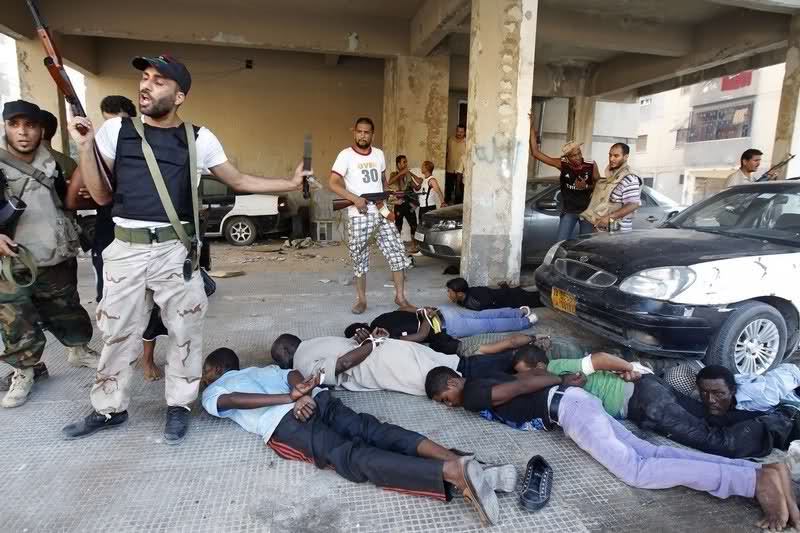[Africa News\Libya]
Eric Goldstein of Human Rights Watch.“Nothing can justify grabbing medical workers and holding them as bargaining chips for the release of an imprisoned man. “The authorities in Zintan should do what they can to hold the captors to account to deter future attacks of this type.”
Photo: YouTube
Black Africans and others face brutality, kidnapping and murder in the current violent climate of Libya.
Six medical workers abducted by a local armed group in Zintan, Libya, were freed on October 23, 2019, after 12 days of captivity, Human Rights Watch said yesterday.
The Zintan authorities should ensure that the captors are held to account.
The six medical workers were part of a larger humanitarian convoy passing through the Nafussa mountains on their way to the town of Ghadames, where they were to provide free medical care, their family members told Human Rights Watch. The family members said they believed the captors were trying to gain leverage for the release of a man imprisoned in Tripoli for undisclosed reasons.
“Nothing can justify grabbing medical workers and holding them as bargaining chips for the release of an imprisoned man,” said Eric Goldstein, deputy Middle East and North Africa director at Human Rights Watch. “The authorities in Zintan should do what they can to hold the captors to account to deter future attacks of this type.”
The six workers included three doctors and an anesthetic technician from Tripoli Central Hospital, a surgical nurse from the al-Hadba General Hospital, and a surgeon from the Abu Salim Trauma Hospital. Human Rights Watch spoke with family members of three abducted health workers and three colleagues or friends of the six medical workers by phone.
One of the participants in the convoy who witnessed the abduction and asked to remain anonymous for fear of retaliation told Human Rights Watch that the convoy of cars and buses included 15 medical workers who were planning to perform surgery and medical procedures as volunteers in Ghadames for patients from all over the Nafussa mountains. Some family members had joined them for the trip.
He said that four men armed with rifles, possibly Kalashnikovs or AK-47s, stopped the convoy at around 10 a.m. on October 11 at a junction at the foot of the Nafussa mountains. They put the six men in a four-wheel-drive car and drove in the direction of Zintan.
“The men waiting for us at the junction appeared to know that we would be taking that route to Ghadames,” he said. “They specifically asked for medical staff who were either working at the Tripoli Central Hospital or were from the Souq el-Jomaa area of Tripoli. They disembarked six people from the convoy based on this [criteria] and took them away.”
He said the people in the convoy later found out that the abductors were seeking to free Izzedine al-Wahishi, a man from Zintan detained in Tripoli who had been arrested while he was in al-Khalil clinic, which they mistook to be the Tripoli Central Hospital as they are on the same street. The reason they also took two people from Souq el-Jomaa is that al-Wahishi is detained in a prison in Souq el-Jomaa.
The relatives of the medical workers who spoke with Human Rights Watch were not allowed to visit the captive medical workers but were able to have a few short phone calls with them. The families and colleagues said they did not know where in Zintan the six were held or their conditions of detention.
The family members and the convoy participant, who was also involved in negotiations for their release, said that the abductors demanded, as a precondition to releasing the captives, the release of al-Wahishi, who is being held by the Special Deterrence Force (SDF), an armed group affiliated with the Interior Ministry of the Government of National Accord (GNA), in one of Tripoli’s Mitiga Airport prisons.
The political and military authorities in Zintan are divided in their loyalties between the two rival governments that are vying for legitimacy in Libya, the internationally recognized GNA and the Interim Government based in the east. The divisions emerged before General Khalifa Hiftar, commander of the armed group known as the Libyan National Army (LNA), initiated a military campaign on April 4 against the GNA in Tripoli.
Major General Idris Madi of Zintan is the LNA commander of the Western Military Region. The LNA controls eastern Libya and parts of the south and is allied with the Interim Government. It is trying to wrest control of western Libya from the GNA. The local armed group that abducted the six medical workers is affiliated with pro-LNA groups in Zintan.
GNA authorities should clarify the legal basis for the continued detention of al-Wahishi held in Tripoli, and either charge him if they have evidence of wrongdoing or release him if they find he has committed no crime, Human Rights Watch said.
Given the current state of impunity in Libya, there is a dire need for an international inquiry, such as by an independent commission of inquiry or similar entity. The inquiry should have a mandate to impartially document abuses, identify those responsible for violations, and publicly report on the human rights situation in Libya, Human Rights Watch said. An upcoming opportunity to establish such an investigation will be during the March 2020 session of the United Nations Human Rights Council. Ghassan Salameh, the UN special representative to Libya, the Office of the High Commissioner for Human Rights, and several European governments have already endorsed such a move.





